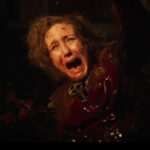Sweden has a rich history of filmmaking, producing some of the most influential and acclaimed movies in world cinema. From the early works of Victor Sjöström and Mauritz Stiller in the silent era to the groundbreaking films of Ingmar Bergman in the 1950s-70s to modern classics, Swedish cinema has left an indelible mark. Here are the 25 greatest and most essential Swedish films of all time.
1. The Seventh Seal (1957)
Ingmar Bergman’s iconic masterpiece is one of the most influential films ever made. Set during the Black Death in medieval Sweden, it tells the story of a knight (Max von Sydow) who plays a chess game against Death while on a journey home from the Crusades. The film grapples with weighty themes of faith, mortality and the silence of God. With its striking imagery, philosophical depth and captivating lead performance by von Sydow, The Seventh Seal is the quintessential Bergman film and a cinematic landmark.
2. Persona (1966)
Another of Bergman’s most acclaimed works, Persona is a mesmerizing psychological drama about the complex relationship between a young nurse (Bibi Andersson) and her patient, a stage actress who has become mute (Liv Ullmann). Through its experimental style, symbolic imagery and intense performances, the film explores themes of identity, duality and the nature of art and performance. Considered one of the greatest films of all time, Persona showcases Bergman at the height of his powers.
3. Wild Strawberries (1957)
This poignant road movie stars director Victor Sjöström as an elderly professor looking back on his life while traveling to receive an honorary degree. Through flashbacks, dreams and encounters along the way, he reflects on his past, his regrets and his relationships. With its meditative pace, strong performances and profound insights into aging and memory, Wild Strawberries is a moving, introspective drama from Bergman.
4. Fanny and Alexander (1982)
Bergman’s opulent period drama, originally conceived as a television miniseries, chronicles a year in the life of the Ekdahl family in early 1900s Sweden. Told from the perspective of the two young siblings, Fanny and Alexander, it’s a vivid, colorful tapestry full of joy and hardship, comedy and tragedy, magic and reality. Featuring Bergman’s typically masterful direction and superb ensemble cast, Fanny and Alexander won four Academy Awards, including Best Foreign Language Film.
5. The Virgin Spring (1960)
Based on a 13th-century Swedish ballad, Bergman’s The Virgin Spring is a powerful medieval revenge tale about a father’s merciless response to the rape and murder of his young daughter. Winner of the Academy Award for Best Foreign Language Film, it’s a stark, haunting work filmed in striking black-and-white by Sven Nykvist. The story would later be adapted into the American film The Last House on the Left.
6. Scenes from a Marriage (1973)
Originally a six-part television miniseries that was edited into a theatrical film, Bergman’s Scenes from a Marriage is a searing portrait of a disintegrating relationship. Liv Ullmann and Erland Josephson star as the married couple whose “perfect” union crumbles over the years due to poor communication, infidelity, divorce and other strains. Raw and unflinching, it’s one of Bergman’s most emotionally intense and psychologically complex character studies.
7. Cries and Whispers (1972)
Harriet Andersson, Ingrid Thulin and Liv Ullmann star as three sisters who come together at their family estate as one of them slowly dies of cancer. Through a series of flashbacks, dream sequences and emotionally charged encounters, Bergman explores the sisters’ relationships, rivalries and regrets. Filmed in vivid shades of red by Sven Nykvist, Cries and Whispers is a visually stunning and psychologically probing chamber drama.
8. The Phantom Carriage (1921)
Victor Sjöström’s silent horror classic, based on a novel by Nobel laureate Selma Lagerlöf, tells the legend that the last person to die on New Year’s Eve must drive Death’s chariot for the next year, collecting the souls of the dead. Sjöström stars as an alcoholic who is forced to look back on his misdeeds. With its innovative special effects and ghostly atmosphere, The Phantom Carriage was a major influence on Ingmar Bergman, who would later cast Sjöström in Wild Strawberries.
9. Smiles of a Summer Night (1955)
Bergman showed his lighter side with this delightful romantic comedy set in turn-of-the-century Sweden. The plot revolves around the romantic entanglements between four couples from different social classes during a weekend at a country estate. Full of wit, sophistication and sexual gamesmanship, Smiles of a Summer Night was later adapted into the Stephen Sondheim musical A Little Night Music.
10. The Magic Flute (1975)
Bergman’s charming film version of Mozart’s beloved opera was originally made for Swedish television. Using a theater stage as the main set, it tells the fantastical story of a prince who must undergo trials to win the hand of a princess, aided by a magic flute. With its colorful costumes and sets, elegant puppetry and lively musical performances, Bergman’s The Magic Flute captures the whimsy and enchantment of the original opera.
11. Sawdust and Tinsel (1953)
Also known as The Naked Night, this early Bergman film takes place in a traveling circus around the turn of the 20th century. It focuses on the humiliations endured by the circus ringmaster (Åke Grönberg) and his young mistress, the bareback rider (Harriet Andersson). Shot in expressionistic black-and-white, Sawdust and Tinsel showcases Bergman’s visual flair and his recurring interest in the circus as a metaphor for life.
12. My Life as a Dog (1985)
Lasse Hallström’s bittersweet coming-of-age story follows a young boy, Ingemar, who is sent to live with relatives in the 1950s while his mother is dying of tuberculosis. As he adjusts to his new life, Ingemar finds humor and resilience through his active imagination. My Life as a Dog is a touching, funny and nostalgic portrait of childhood innocence and the pains of growing up.
13. Show Me Love (1998)
Lukas Moodysson’s realist teen drama caused a sensation with its frank depiction of the romance between two high school girls in a small, boring Swedish town. Also known as Fucking Åmål, it follows the tentative relationship between the popular Elin (Alexandra Dahlström) and the shy, bookish Agnes (Rebecka Liljeberg). Show Me Love is a tender, honest and relatable story of adolescent love and self-discovery.
14. The Emigrants (1971)
Jan Troell’s epic historical drama, based on a series of novels by Vilhelm Moberg, depicts a Swedish farming family’s emigration to America in the mid-19th century. Max von Sydow and Liv Ullmann star as the husband and wife who endure hardships, tragedies and triumphs as they journey to build a new life. Filmed on location in Sweden and the American Midwest, The Emigrants is a visually majestic and emotionally powerful saga. It was followed by a 1972 sequel, The New Land.
15. Let the Right One In (2008)
Tomas Alfredson’s atmospheric horror film tells the story of the friendship between a bullied 12-year-old boy and a young female vampire in a snowy Stockholm suburb in the 1980s. Based on the novel by John Ajvide Lindqvist, Let the Right One In is a haunting, poetic and unconventional vampire tale that also functions as a tender coming-of-age story and an allegory for childhood loneliness.
16. The Silence (1963)
The final film in Bergman’s “faith trilogy” that also includes Through a Glass Darkly and Winter Light, The Silence is a stark, enigmatic drama about two sisters, Anna and Ester, who stop at a hotel in a foreign country on the brink of war. As the sisters navigate their tense, ambiguous relationship, Ester’s declining health and Anna’s sexual explorations, Bergman explores themes of isolation, desire and spiritual emptiness. Sven Nykvist’s striking cinematography adds to the film’s unsettling, dreamlike atmosphere.
17. Force Majeure (2014)
Ruben Östlund’s darkly comic psychodrama depicts the marital fallout after a Swedish family survives an avalanche while on a ski vacation in the French Alps. When the father runs away to save himself, leaving his wife and children behind, it sets off a chain of recriminations and self-doubt that threatens to tear the family apart. Force Majeure is a biting satire of masculinity, marriage and societal expectations, featuring squirm-inducing moments of humor and discomfort.
18. The Passion of Anna (1969)
Liv Ullmann stars as the title character, a reclusive woman still reeling from a recent divorce and the death of her son. She becomes involved with a man (Max von Sydow) still haunted by his past on an island where a serial killer is on the loose. Featuring Bergman’s trademark psychological intensity and bleak landscapes, The Passion of Anna is a complex, challenging exploration of grief, guilt and human connection.
19. A Man Called Ove (2015)
Based on the bestselling novel by Fredrik Backman, Hannes Holm’s heartwarming dramedy centers on Ove, a curmudgeonly widower whose suicide attempts are continually thwarted by his boisterous new neighbors. As Ove’s past is revealed through flashbacks, the film becomes a poignant meditation on love, loss and the power of community. Rolf Lassgård gives a winning performance as the grumpy yet endearing protagonist.
20. Everlasting Moments (2008)
Jan Troell’s period drama, set in the early 20th century, tells the story of Maria Larsson, a working-class woman in a small Swedish town who wins a camera in a lottery and discovers a talent for photography. As Maria navigates her roles as a wife, mother and artist, the film becomes a moving portrait of female empowerment and the transformative power of art. With its luminous cinematography and strong lead performance by Maria Heiskanen, Everlasting Moments is a rich, absorbing historical tale.
21. The Square (2017)
Ruben Östlund’s Palme d’Or-winning satire takes aim at the contemporary art world and the absurdities of modern society. It follows a museum curator (Claes Bang) whose life begins to unravel after he’s the victim of a pickpocketing scheme and the museum’s PR campaign for a new installation goes awry. Featuring several provocative, unforgettable set pieces, The Square is a sly, unsettling commentary on art, class, masculinity and human behavior.
22. Ondskan (2003)
Mikael Håfström’s coming-of-age drama, based on the semi-autobiographical novel by Jan Guillou, follows a teenage boy in 1950s Sweden who is sent to an elite boarding school, where he faces bullying and abuse from his classmates and teachers. As he learns to stand up for himself and others, the film becomes a powerful story of resilience, moral courage and the consequences of violence. Ondskan was nominated for the Best Foreign Language Film Oscar.
23. The Sacrifice (1986)
Russian filmmaker Andrei Tarkovsky’s final film, The Sacrifice was an international co-production filmed in Sweden with many of Ingmar Bergman’s frequent collaborators, including cinematographer Sven Nykvist and actor Erland Josephson. It tells the story of a middle-aged intellectual who makes a bargain with God to avert a nuclear holocaust. With its long takes, metaphysical themes and striking apocalyptic imagery, The Sacrifice is a haunting meditation on faith, despair and the possibility of redemption.
24. Songs from the Second Floor (2000)
Roy Andersson’s surreal, darkly comic film consists of a series of vignettes set in a bleak, dreamlike version of modern Sweden. With its static camera, meticulously composed tableaux and absurdist humor, Songs from the Second Floor satirizes the alienation, bureaucracy and existential despair of contemporary life. It’s a singular, unclassifiable work that established Andersson’s unique cinematic voice.
25. Pelle the Conqueror (1987)
Bille August’s epic period drama, based on the novel by Martin Andersen Nexø, follows a Swedish father and son who emigrate to Denmark in the late 19th century to find work. Max von Sydow stars as the widowed father who struggles to provide for his son Pelle (Pelle Hvenegaard) as they face poverty, prejudice and hardship. Pelle the Conqueror won the Palme d’Or at Cannes and the Academy Award for Best Foreign Language Film, featuring stunning cinematography and powerful performances.
From the masterful films of Ingmar Bergman to contemporary classics, these 25 movies represent the best of Swedish cinema. With their artistic vision, psychological depth, and unique sensibilities, they have left an enduring impact on world cinema and continue to resonate with audiences today. Whether you’re a longtime fan of Swedish films or a curious newcomer, these essential works are not to be missed.





